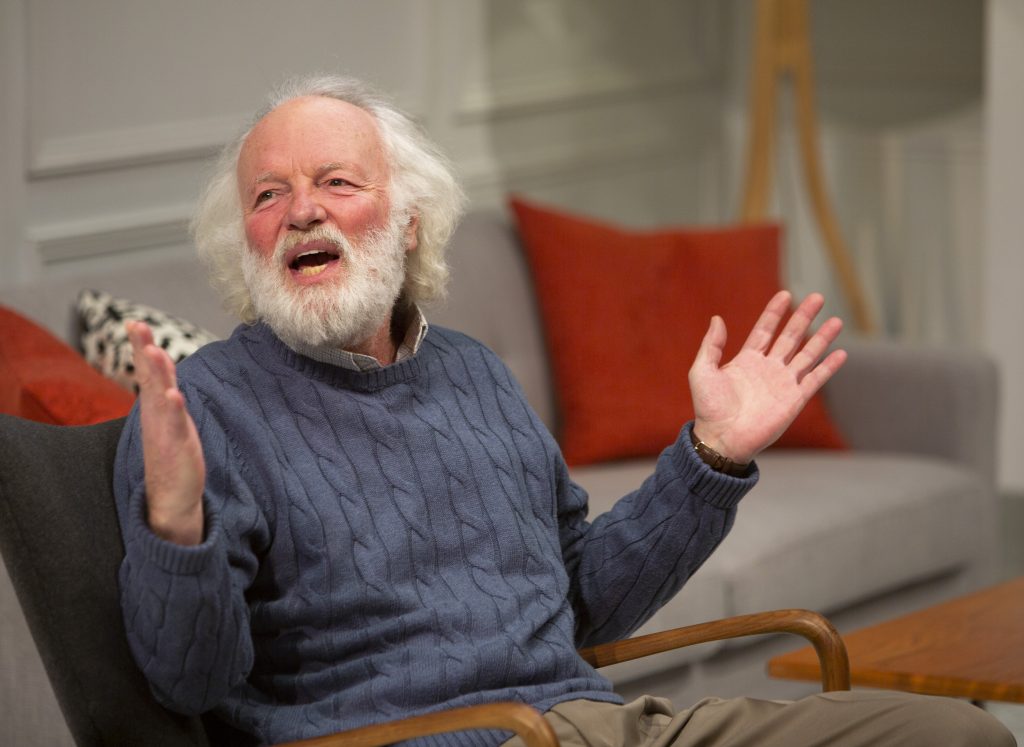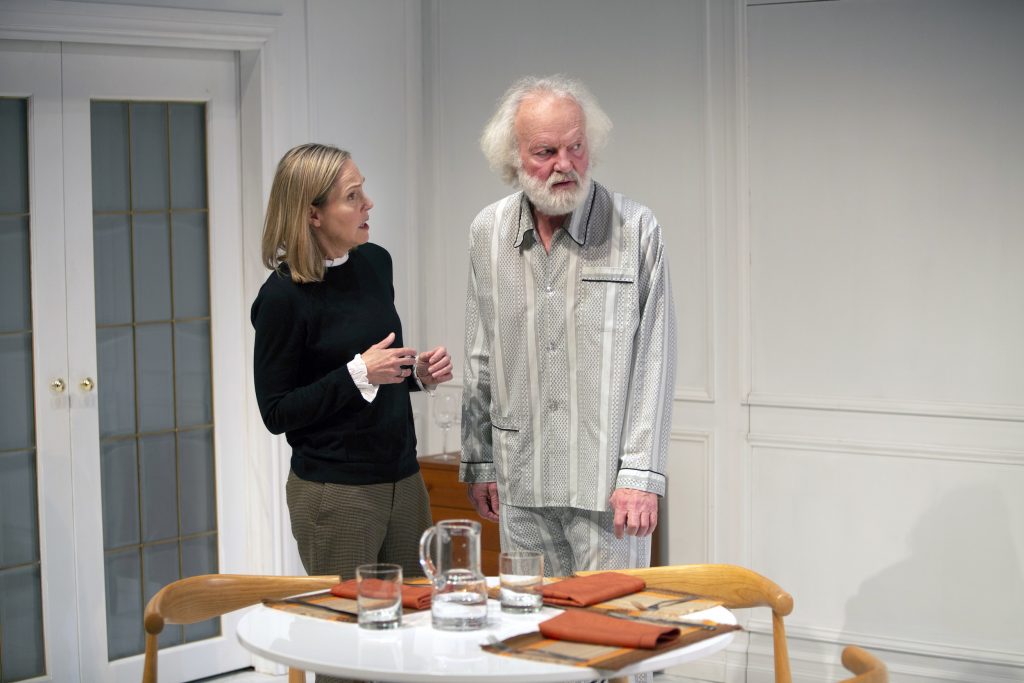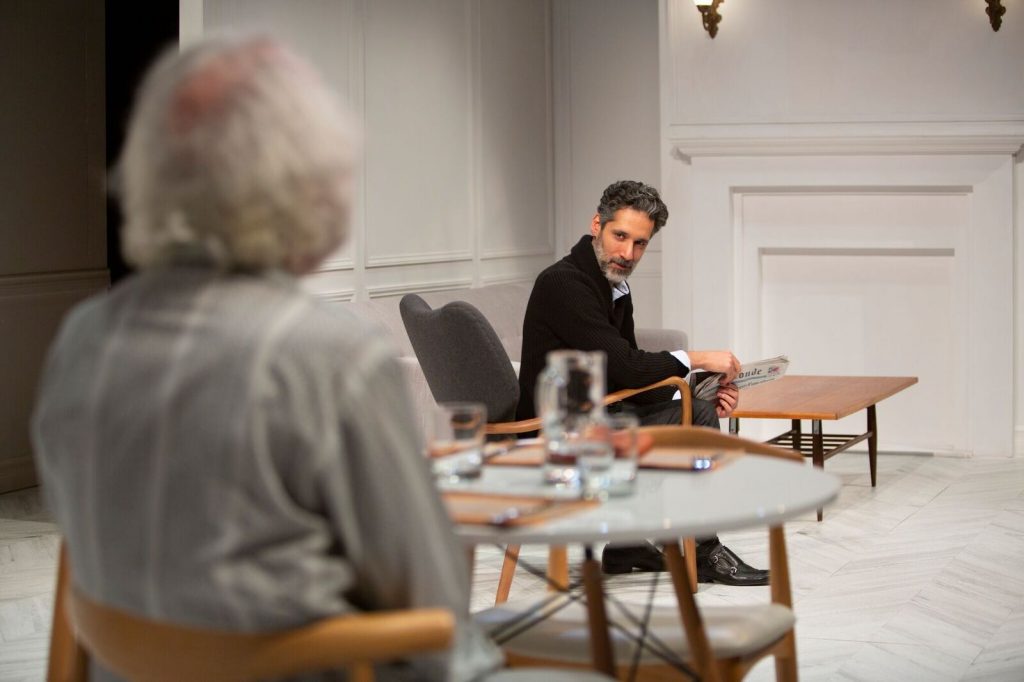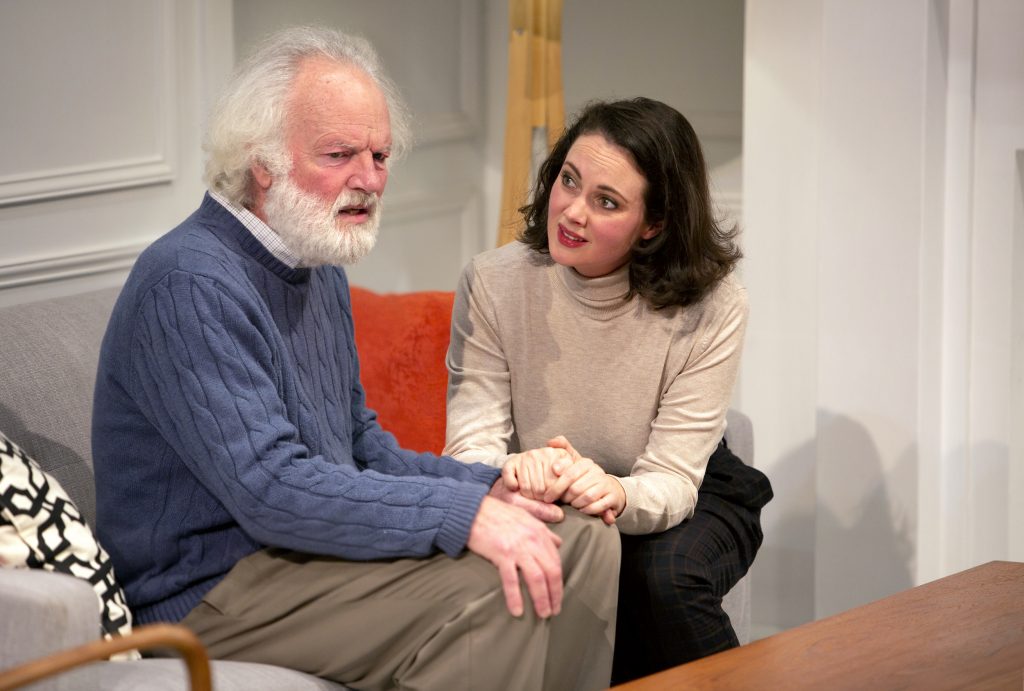
Credit: Tim Matheson
The Father
At The Cultch until November 30, 2019
Tickets from $25 at tickets.thecultch.com or 604-251-1363
Posted November 22, 2019
No one could have predicted that the opening night of The Father, the inaugural production of The Search Party theatre company, would fall a day after the passing of John Mann, diagnosed in 2012 with early onset Alzheimer’s. Mann died on November 20 at the age of 57 and a heavy curtain of sorrow hung over the entertainment industry – and beyond – from eastern to western Canada – but especially in Vancouver where he was much loved as an actor, the lead singer/songwriter of Spirit of the West and a man.
The Father, written in French by Florian Zeller and translated by Christopher Hampton, is about a man in the mid-late stage of dementia and it does what I have never experienced quite like this before in the theatre: the play takes us inside the mind of André, a retired engineer who has been a vital, authoritative man with a large ego. But now, like André, we wonder if he lives in his own flat or has moved into his daughter Anne’s apartment. We don’t know why the furniture appears to be different. Where is the sofa that was here in the last scene? We don’t know if Elise, his other daughter, his repeatedly avowed “favourite daughter”, is even alive. And who are these men that come and go? Is his daughter Anne really leaving Paris for London and abandoning him?

Credit: Tim Matheson
André still has an eye for beautiful women and, embarrassingly, he comes on to Laura, a paid caregiver Anne has brought into the household to lessen the burden on her and her husband Pierre. André tells Laura he has been a tap dancer (not true) and in a grotesque display he demonstrates. But when Laura laughs he turn viciously on her, “You have that awful habit of laughing inanely.”
Like King Lear, he feels beleaguered and he unfairly favours the daughter who is not around over the dutiful one who devotes all her energy into making him comfortable, cooking for him, consoling him and putting her marriage at risk for him.
Jillian Fargey, as Anne, models devotion and long-suffering. The bind Anne is in is clearly signalled by Fargey: smiling, loving and cajoling André but exhausted by the effort and turning her face away when he accuses her of trying to be rid of him or of stealing the watch he obsesses over. She is, he says, “heartless and manipulative.”
Kayvon Khoshkam and Stephen Lobo play Anne’s former husband (Antoine) and present spouse (Pierre). While André can’t really remember who they are, he internalizes their exasperation and believes they physically and verbally abuse him. “How long do you intend to hang around getting on everybody’s tits?”, he fantasizes both Pierre and Antoine asking him.

Credit: Tim Matheson
Emma Slipp plays various characters including Elise, and Agnes Tong is the cheerful caregiver Anne hires after André has had a row with the previous one and probably the one before that.
Just as it is difficult for those close to André to be patient and remember he had once been an intelligent, caring father – albeit judgemental and hard to please, it is difficult for us to know who André is or was. Kevin McNulty is absolutely outstanding in the role – perhaps his best-ever performance. Just as we begin to pity André, he turns nasty and we withdraw our sympathy. But as the play progresses, even André’s nastiness is forgivable. McNulty manoeuvres these terrifying switches with great precision, clarity and compassion.
Amir Ofek provides a white-on-white, clean, contemporary set that is sometimes illuminated (by Itai Erdal) in the blazing white of a hospital surgical unit. Like André’s mind, the room gradually loses furniture until it is almost empty.
Sensitively directed by Mindy Parfitt (artistic director of this new theatre company), The Father goes straight to the heart. It is sometimes billed as a ‘tragic farce’ and some in the audience laughed hard and loudly for the first 45 minutes. Personally, I found nothing funny in the gradual, bleak decline of a character’s mind. Farce is not apt. Tragedy, which usually focusses on a hero, caught in an unbearable situation brought on by a ‘fatal flaw’, isn’t apt, either. Dementia and/or Alzheimer’s is not the result of a fatal flaw. It is indiscriminate and, therefore, terrifying.

Credit: Tim Matheson
My mother, left at an orphanage as a toddler by her single mother, spent her entire life seeking her biological mother. At seventy-six, in the last stages of dementia, she thought I was her mother. If it made her happy, who was I to disabuse her of whatever small pleasure she got from believing this?
The Father is a profoundly moving play and this is a very fine production. Those who laughed in the first half, were silent in the second. Most of us – if not all – will have to deal with dementia or Alzheimer’s in a loved one – or worse, in ourselves.
How in God’s name do you prepare yourself or your loved ones for such an eventuality?

